The Best Science Books Of 2021
33:41 minutes
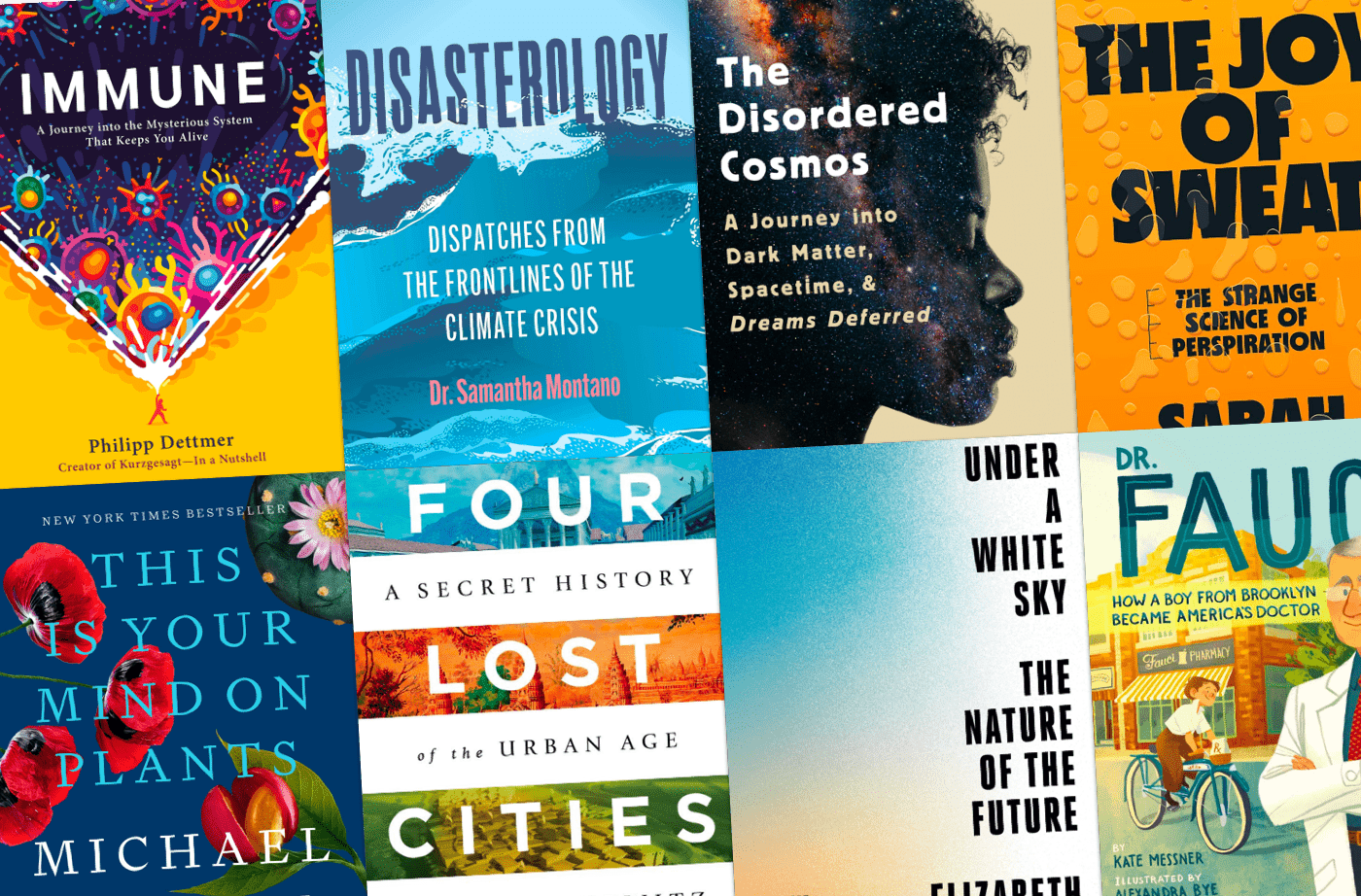 Another year is in the books. And whether you got out more this year or continued precautionary staying at home, we hope you at least got some good reading done.
Another year is in the books. And whether you got out more this year or continued precautionary staying at home, we hope you at least got some good reading done.
If not, you still have a whole winter ahead, and SciFri has rounded up another batch of the year’s best books. On this year’s list, you’ll find enthralling tales of the deep ocean, a fun primer on how the immune system works, and a cosmologist’s view of how science can do better by those it’s excluded.
Ira Flatow rounds up more than a dozen favorite titles, with help from editors Valerie Thompson, of Science, and Stephanie Sendaula, of Library Journal.
Disclaimer: When you purchase products through the Bookshop.org link on this page, Science Friday may earn a small commission which helps support our journalism.
Associate editor for the Library Journal
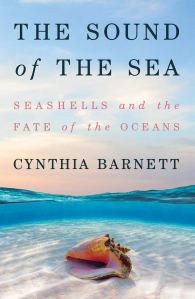 The Sound of the Sea: Seashells and the Fate of the Oceans
The Sound of the Sea: Seashells and the Fate of the OceansBarnett brings her curiosity for seashells to this natural history about what seashells can tell us about the mollusks who inhabit them, and what shells have meant over the years, as they have been used for currency, fashion, and more. This book is for readers who want something fun, yet thought-provoking.
Listen to an interview with Cynthia Barnett on Science Friday.
Read an excerpt of the book.
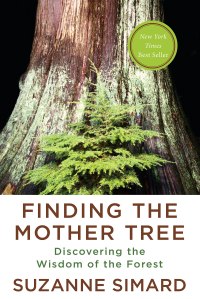 Finding the Mother Tree: Discovering the Wisdom of the Forest
Finding the Mother Tree: Discovering the Wisdom of the ForestSimard shares her knowledge of forestry and conservation in a memoir that details her life growing up amongst the forests, and learning the various ways that trees communicate with each other. This will especially interest fans of The Overstory by Richard Powers, a novel inspired by Simard’s life and work.
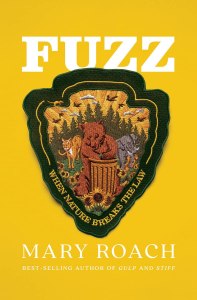 Fuzz: When Nature Breaks the Law
Fuzz: When Nature Breaks the LawRoach returns with another quirky story of popular science—this time about human-wildlife conflict. She brings her trademark humor to her story about her time with people working in the field of forensic science and conservation genetics, and what we can do about animal encounters in our everyday lives.
Valerie Thompson also recommends this book, saying:
A round-the-world romp through human-wildlife conflict that centers the stories of the scientists, inventors, and bureaucrats who deal with the fallout from the “crimes” perpetuated by flora and fauna. Immersive first-hand investigations, interviews with eccentric experts, and footnotes filled with dinner party fodder come together in Mary Roach’s entertaining narrative.
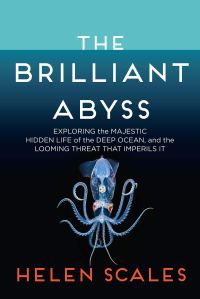 The Brilliant Abyss: Exploring the Majestic Hidden Life of the Deep Ocean, and the Looming Threat That Imperils It
The Brilliant Abyss: Exploring the Majestic Hidden Life of the Deep Ocean, and the Looming Threat That Imperils ItScales has a fascination with the deep sea, and creates an inviting narrative exploring why others should be interested—and concerned—with the future of our oceans. This book is a nice companion to ‘The Sound of the Sea,’ and will spark the interest of anyone curious about what lives below the surface.
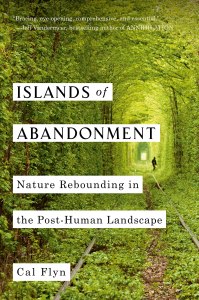 Islands of Abandonment: Nature Rebounding in the Post-Human Landscape
Islands of Abandonment: Nature Rebounding in the Post-Human LandscapeFlynn explores what happens when nature takes its course, especially in places that have been abandoned by humans because of decay or economic disaster. This is a worldwide tour showing how plant and animal life is growing, and often thriving, in the absence of people, and how our absence is sometimes vital for ecosystems to flourish.
Senior editor focusing on books for Science Magazine
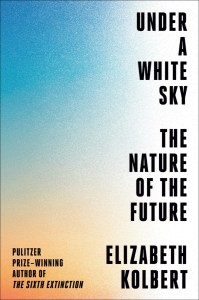 Under a White Sky: The Nature of the Future
Under a White Sky: The Nature of the FutureA frank meditation on the extraordinary efforts underway to mitigate anthropogenic planetary problems. Elizabeth Kolbert is attentive to the irony inherent in trying to engineer our way out of problems we’ve engineered our way into, but she effectively conveys why we may have no other choice.
Listen to an interview with Elizabeth Kolbert on Science Friday.
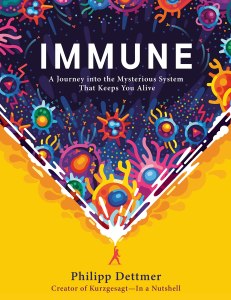 Immune: A Journey into the Mysterious System that Keeps You Alive
Immune: A Journey into the Mysterious System that Keeps You AliveA solid (sometimes silly) immune system primer for armchair immunologists, from the creator of the popular science YouTube channel, Kurzgesagt. This book gets the science right while keeping things light and conversational, a tall order for a complex subject.
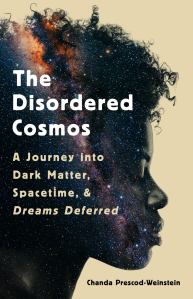 The Disordered Cosmos: A Journey into Dark Matter, Spacetime and Dreams Deferred
The Disordered Cosmos: A Journey into Dark Matter, Spacetime and Dreams DeferredA timely examination of modern physics that celebrates all the field has accomplished, while challenging readers to confront uncomfortable truths about its practice. There is no shortage of books that (rightly) acknowledge scientific achievement, but we also owe it to ourselves to take a hard look at the parts of science that aren’t working. Chanda Prescod-Weinstein’s incisive critique does both.
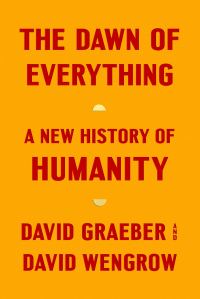 The Dawn of Everything: A New History of Humanity
The Dawn of Everything: A New History of HumanityA myth-busting re-appraisal of human history that showcases the intelligence and agency of ancient people, and the diverse societies and societal solutions they helped shape. This provocative book will likely stimulate new lines of research.
Host and executive producer of Science Friday
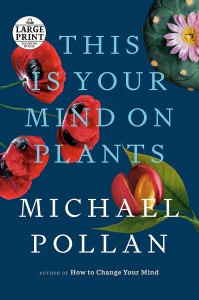 This Is Your Mind On Plants
This Is Your Mind On PlantsWho knew how much the world depends on plants not just for food but for thought!
Listen to an interview with Michael Pollan on Science Friday.
Read an excerpt of the book.
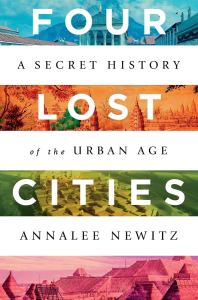 Four Lost Cities: A Secret History of the Urban Age
Four Lost Cities: A Secret History of the Urban AgeWe like to classify some ancient civilizations as being lost, when in fact they weren’t lost at all. This book explores why.
Listen to an interview with Annalee Newitz on Science Friday.
Read an excerpt of the book.
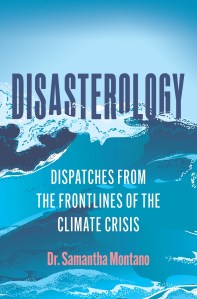 Disasterology: Dispatches from the Frontline of the Climate Crisis
Disasterology: Dispatches from the Frontline of the Climate CrisisA “disaster-ologist” who studies disasters—and what determines how well people and communities are able to bounce back from crisis.
Listen to an interview with Samantha Montano on Science Friday.
Read an excerpt of the book.
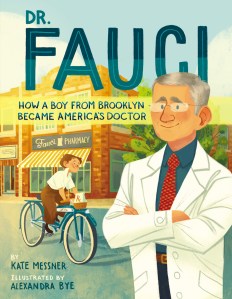 Dr. Fauci: How A Boy From Brooklyn Became America’s Doctor
Dr. Fauci: How A Boy From Brooklyn Became America’s DoctorThe childhood of Dr. Anthony Fauci, and how his deep curiosity and never-give-up attitude helped shape his career later in life.
Listen to an interview with Kate Messner on Science Friday.
Read an excerpt of the book.
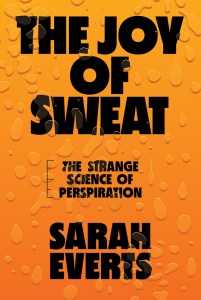 The Joy of Sweat
The Joy of SweatWhy do some people hate to sweat and lots of people seek out sweat? From hot yoga to steam baths, we explore the science of sweat.
Listen to an interview with Sarah Everts on Science Friday.
Read an excerpt of the book.
Invest in quality science journalism by making a donation to Science Friday.
Valerie Thompson is a Senior Editor at Science Magazine in Washington, D.C.
Stephanie Sendaula is a programming and outreach specialist for LibraryLinkNJ in Lawrenceville, New Jersey.
IRA FLATOW: This is Science Friday. I’m Ira Flatow. As the gift-giving season teeters to a close, I’m very much hoping you ended up with some money to spend at your local bookstore. Sure, gift certificates sometimes get a bad rap. Some people feel they’re, what, less thoughtful. But it’s really nice to have that kid-in-a-candy-store sense of possibility by choosing some books for yourself.
And in case you’re having trouble deciding which ones, we have some suggestions for you. My guests have also been doing a lot of reading this year. And today, we’ll share our favorite science books of 2021. So bookworms, grab your shopping list and your library card, and huddle up. Here to talk books with me are my guests, Stephanie Sendaula, Associate Editor with Library Journal. She joins us. And Valerie Thompson, a Senior Editor covering books at Science Magazine.
Hi. Welcome both of you to Science Friday. Welcome back.
STEPHANIE SENDAULA: Thanks so much, Ira.
VALERIE THOMPSON: Thank you for having us again, Ira.
IRA FLATOW: Nice to have you. And just a reminder that everything we’re talking about will also be on our website. You can check out the full list at sciencefriday.com/books.
OK, let’s go right to my pick. I’m going to go ahead and start with my favorite, OK? Or one of my favorites. We did this interview, just a few weeks ago. And I’m talking about Michael Pollan’s book, This is Your Mind on Plants. It’s the last in his series of books, which I’ve always enjoyed. I love his work. And this book was such a great exploration of the ways various cultures around the world have depended on compounds found in plants, have mind-altering properties, including caffeine and peyote. I’m wondering if any of either one of you have read that book and have a comment about it.
VALERIE THOMPSON: Yeah, I have read this book. It’s great. You can’t go wrong with a Michael Pollan book. I mean, it’s you know–
STEPHANIE SENDAULA: Right. I agree.
IRA FLATOW: What I liked is that he started out his career and writing books. He started writing about plants that you eat and the nutrition of it. And now, he has switched to not only do the plants affect your body by health, but they affect your mind.
VALERIE THOMPSON: Yeah, I feel like that’s a very natural transition. He talks in the book a little bit about his interest kind of came from gardening and, like you said, plants that we eat and then kind of moved into this different arena one thing. I was surprised about, though, I don’t think that he talks much about marijuana or cannabinoids. And that’s a big area of interest right now. Maybe he’s got something else in the works for that. But this book itself is really good.
IRA FLATOW: Well, you know, I remember it. And I mentioned this in the interview when we did it that 20 years ago when he was first on our show, he talked about growing a marijuana plant secretly in his backyard. [LAUGHTER]
VALERIE THOMPSON: Oh, my goodness. Well, I suspect that we’ll probably hear more on that subject then from him in the future.
IRA FLATOW: Once again, that book is This is Your Mind on Plants by Michael Pollan. Stephanie, you had a book about plants on your list too, but in this case, it was about trees.
STEPHANIE SENDAULA: It was, yes, Finding the Mother Tree by Suzanne Simard. And I really like this book because she talks about her family. She’s from a family of loggers, so she has a lot of photographs of her family throughout the years. And in this aspect, she’s trying to find the mysteries of the forests and how we should be concerned for them, especially in the wake of climate change with also beetle infestations.
So for me, I really liked it because you get more an aspect to like the personality of trees, like Douglas fir, spruce, and birch, and how they talk to each other and communicate with each other and also the animals that have a home in these trees– so woodpeckers, birds especially. So this is also a perfect book for bird lovers. So I really like it from that aspect as well.
IRA FLATOW: And the name of the book was?
STEPHANIE SENDAULA: Finding the Mother Tree
IRA FLATOW: By Suzanne–
STEPHANIE SENDAULA: Simard.
IRA FLATOW: Simard. What is a mother tree? I mean, what does that mean, finding the mother tree?
STEPHANIE SENDAULA: Yeah, so she talks about how the mother tree is one of the trees that when the it’s older and when it’s dying, it’s passing on its nutrient to these younger trees to help them grow. It’s kind of like a circle of life aspect, which I really liked in that aspect as well because you don’t really think about that. But it is like really a tree family of sorts. It’s really fascinating to learn about.
IRA FLATOW: That is cool. Meanwhile in even deeper histories, you’ll have a book about human evolution, Valerie. That’s your pick. This is a book that contends that we have been wrong about some fundamental assumptions about how human civilizations developed.
VALERIE THOMPSON: Yeah, so this is so great. So the book is called The Dawn of Everything, A New History of Humanity. And it’s co-written by two authors, so the late anthropologist and activist, David Graeber, and archaeologist, David Wengrow. And like you said, yeah, it’s kind of encouraging readers to take everything they think they know about ancient societies and throw it out the window.
So we have this idea that we all evolved from these primitive bands of egalitarian hunter gatherers, and they just reacted to things that happened to them, and that’s how human history unfolded. But this book looks back at the historical documents that we have, incorporates some new and emerging archaeological data and shows the ancient people actually had a great deal of intelligence and a great deal of agency in how things played out.
So it’s not just a case where things were happening to them, and that’s how things played out. It’s like they made decisions, and there was a lot more complexity to it than we have initially thought. And I think this is really interesting because it’s provocative. It goes against some of the ideas that we had about human origins. And I think it’s going to stimulate a lot of new research.
IRA FLATOW: You know, that’s really interesting that you picked that book, The Dawn of Everything because my pick, I was about to bring that up, one of my favorite books is called Four Lost Cities by Annalee Newitz. And it talks exactly about these kinds of mythologies that we have. It’s a deep dive into why ancient cities may have been abandoned. And you truly get to see places like Cahokia near St. Louis and Angkor Wat. And it talks about, hey, these cities were not just abandoned. This was thoughtfully done, the way these people left the cities.
VALERIE THOMPSON: Yeah, and I think something that both of these books do that’s really nice and that hasn’t always traditionally been done is they bring in voices and perspectives from Indigenous groups that have a stake in the story. And that’s something that I think is really valuable in both cases.
IRA FLATOW: Stephanie, have you read this book?
STEPHANIE SENDAULA: No. I want to read that because it kind of does tie into one of the books I’m going to talk about later, Islands of Abandonment. And so I really want to read Four Lost Cities because that really is something, a subject I’m thinking about a lot and looking forward to reading more about.
IRA FLATOW: Yeah, well, go ahead. Talk about that book now.
STEPHANIE SENDAULA: Oh, OK, yeah. We’re going to talk about it a little bit later. But so Islands of Abandonment by Cal Flyn. And this one was really fascinating to me because she’s talking about how nature has taken its course in places where humans have either abandoned it because of economic disaster, or because of natural disaster, or because of war. So she talks about Chernobyl of all places, where it has been abandoned. But also, there’s some really interesting diversity, biodiversity happening in the area.
She also visits the Marshall Islands, where there’s an abandoned military base, where this underwater ecosystem, which is blossoming. So for me this is really interesting because these are places where you don’t always think about them on a regular basis, but they are seeing this new revitalized life. And to me, that’s just really fascinating to read about. And I think this is a really great read also because it touches on so many different aspects. So it is history. It’s a natural history but also sociology. So this kind of spans a lot of different genres. And people can take it and get a lot out of it from that reason alone as well.
IRA FLATOW: Cool. That sounds very interesting. And just to repeat the book for people who just pulled out their pencil.
STEPHANIE SENDAULA: Islands of Abandonment– yes, sorry about that. It’s Islands of Abandonment by Cal Flyn.
IRA FLATOW: That’s really cool. Valerie, we’ve been hearing all fall and winter about supply chain woes, thanks to the pandemic and the other disruptions. And this is affecting book availability too, isn’t it?
VALERIE THOMPSON: You know, it’s funny. I think, yes, it definitely is affecting book availability. But I feel like from my perspective, I’m not the one that has to deal with it, necessarily. The poor people at the presses are the ones that are really scrambling. And I just get these announcements every once in a while that’s like, this date has been pushed back by a month or so. So it’s less of an issue for me.
IRA FLATOW: Are the books being pushed back because they won’t be available in bookstores? Or are the publishers saying, wow, this is just not a good time to release the book?
VALERIE THOMPSON: Gosh, I’m not sure what the ratio of that is. I’m sure that it’s a little bit of both. And I think that sometimes, they’ll explicitly say, we don’t have the printing capacity right now. So but yeah, I’m sure it’s a little bit of both things.
IRA FLATOW: But of course, a lot of books are coming out on PDF, right, or e-books? Could they not– people get download those? Or some people just don’t like to read them that way.
VALERIE THOMPSON: Yeah, that’s how I prefer to read books when I’m reading for pleasure. I guess, if I’m reading to review, I’d like to have a hard copy in hand just so I can make little notes and stuff. But I think that’s just a personal preference.
IRA FLATOW: Stephanie, do you do you mind reading books on e-books?
STEPHANIE SENDAULA: Yeah, I really love the print book, actually. I also really love audio books lately because, for, me, it’s, like a good way to listen and engage with something while I’m just taking the material in a different aspect. So yeah, I really– I don’t know. PDFs, I’m kind of getting tired of looking at my screen all day.
IRA FLATOW: [LAUGHS]
STEPHANIE SENDAULA: So I do need the print book a lot of the times. But I do like audio as well as a nice change of pace.
IRA FLATOW: Yeah.
VALERIE THOMPSON: That’s what I’m hearing a lot from reviewers too. When I send out books for review, they’re like, please, whatever you do, if you can send a print copy, I can’t look at my computer screen anymore. [LAUGHS]
STEPHANIE SENDAULA: I can relate to that so much.
IRA FLATOW: Well, you know, I have the opposite problem because I review a lot of books. I’m very happy to get the e-version of it because I can make notes on the page in my iPad as I put them on there.
STEPHANIE SENDAULA: OK, that is a good point.
VALERIE THOMPSON: It’s nice as an editor, too, when you’re working on a book review to be like, oh, this passage that the person is writing about– if I just had a print copy of the book, I’d have to flip through the whole book looking for it. And I can just kind of search it in a PDF. So that makes it a little easier from my perspective.
IRA FLATOW: Yeah. Stephanie and Valerie, let’s go back to one of your shared picks, and that is Fuzz by Mary Roach. I love Mary Roach and her one-word book title. What’s this one about? Valerie, you want to start off?
VALERIE THOMPSON: Sure, yeah. So I’m a huge fan of Mary Roach too. And her latest book, Fuzz, When Nature Breaks the Law, has kind of all the elements that you probably like and I like about her writing, which is these immersive, firsthand investigations and interviews with eccentric experts.
But this one centers on human wildlife conflict. So she’s looking at the, quote/unquote, crimes committed against humans by animals and plants. So she starts by looking at felonies– so deaths caused by bears, and elephants, and poisonous plants, and falling trees. And then she moves on to the lesser offenses– so things like birds interfering with airplanes, and monkeys that harass city dwellers, and deers that are colliding with cars, things like that.
IRA FLATOW: She really has a way of finding offbeat stuff, doesn’t she?
VALERIE THOMPSON: Yeah, yeah, that’s such a fun thing about this book.
IRA FLATOW: Stephanie, you too?
STEPHANIE SENDAULA: Yeah, that’s why I loved it too because these are the things I didn’t think about the birds interfering with airplanes. I was like, wait, that actually is something, a serious subject, but we don’t think about it that often. So that was really fun to read about.
IRA FLATOW: Yeah, she finds fun things to read from poop to the military to other kinds of things.
[LAUGHTER]
VALERIE THOMPSON: It’s fun. Yeah, it’s a fun book. I mean, she talks about all these kind of interventions that we’re trying to do– so like making bear-proof dumpsters, and these remote-control robotic predator birds that are designed to scare away nuisance birds, and there’s even this really interesting chapter on the people that are doing research on humane extermination methods for problem species. So it’s pretty wide-ranging.
IRA FLATOW: Yeah, and just again, that’s Fuzz by the incomparable Mary Roach, who is fearless, right? You know, she is. I would have to describe that she’s not afraid to write what she says and how she feels, and we all find it very, very interesting when she does that.
VALERIE THOMPSON: Yeah, I would say that my only small criticism was that she misses a chance to discuss the larger problem, which is that these kind of so-called offenses that wildlife are committing aren’t exactly unprovoked. I mean, they’re happening because we’re doing things like encroaching on habitats, and destroying traditional food sources, and introducing invasive species. So we have to take a little bit of the blame there for that one.
IRA FLATOW: Stephanie, you agree?
STEPHANIE SENDAULA: I agree, yeah. Yeah, I definitely agree with that. Yeah, a lot of the instances like we are encroaching on their natural habitat, especially for the military bases or just places where we probably shouldn’t belong. So yeah, no, I agree with you on that aspect, Valerie.
IRA FLATOW: This is Science Friday from WNYC Studios. In case you’re just joining us, we’re talking about the best science books of 2021 with Stephanie Sendaula and Valerie Thompson. I’m going to toss my own favorite book in here, and that’s The Joy of Sweat by Sarah Everts. It was such a fun book about the science of perspiration. I mean, who knew? It covers everything– why we do it, how sweating can go wrong.
And Sarah looked at everything from weather sports drinks are actually useful– maybe not– and how museums that display historical clothing have to deal with the destructive nature of sweat to fabric. Who knew? Who thought about that kind of stuff? And I guess, that’s why Sarah wrote the book. And then it even includes the original Apollo spacesuits we talked to her in July, of course, at the height of summer sweating season. But it really was a very fun book.
VALERIE THOMPSON: I was going to ask if this came out of some sort of personal lockdown new commitment to working out or something.
[LAUGHTER]
IRA FLATOW: Yeah, but but on the other hand, there are people who like to sweat. And we were talking about that too, people who go to the saunas, and they go to hot yoga.
VALERIE THOMPSON: Oh, of course, yeah.
STEPHANIE SENDAULA: Yeah, yeah, I want to read that one for that reason because I have tried hot yoga, and it’s a little bit too much sweating for me, to be honest. So I am really interested in reading about the science of why we sweat and why people like to sweat.
IRA FLATOW: Sarah also said that she’s really an intense sweater, and she wants to know why. And she got some answers about why she is such an intense sweater– and I don’t mean to thing made out of wool. But I’m not going to spoil it for anybody who wants to read the book because it’s a lot of fun.
VALERIE THOMPSON: Yeah, now, I’m curious.
IRA FLATOW: Yeah.
STEPHANIE SENDAULA: Yeah, I am too.
IRA FLATOW: And it’s called, again, The Joy of Sweat by Sarah Everts. Stephanie, you have another one on your list that we covered on the show this year, The Sounds of the Sea by Cynthia Barnett– all about seashells, our relationship with them through history, and what the future holds for them in acidifying oceans. What struck you most about this book?
STEPHANIE SENDAULA: Yeah, this is probably one of my favorite books of this year, I think, just because she talks about how we know so much about seashells, the outside of them, but we don’t really know that much about the animals that live inside of them.
And also, I really like the part about how seashells, throughout history, have been used as money, and weapons, and gifts, and even art. Like, the whole seashell craze of the post-war period. So you’re thinking about seashells, all these different types of periods of history and how they’ve each changed, but also people who collect them, which I loved seashells as a kid. And you’re just thinking about, oh, right, these have such a varied history and how they’re kind of adapting in the face of climate change as well.
IRA FLATOW: Yeah, it was very– it was fascinating.
STEPHANIE SENDAULA: It really was. What did you like about it, Ira?
IRA FLATOW: I think one of my favorite things that I learned was that Shell Oil was started by a family, that originally made their living selling seashells.
STEPHANIE SENDAULA: Yeah, I had no idea.
IRA FLATOW: That’s just crazy.
VALERIE THOMPSON: I would have never made that connection.
IRA FLATOW: Yeah, a little bit too on-the-nose, given the connection between fossil fuels and climate change. And now, we’re talking about something naturally occurring in nature.
STEPHANIE SENDAULA: Right.
IRA FLATOW: And just to repeat for your pencil, The Sounds of the Sea by Cynthia Barnett was the name. We have to take a quick break. When we come back, more science book recommendations for your next trip to the library or gift card spending spree.
VALERIE THOMPSON: So there’s a ton of rah-rah, isn’t science amazing, books out there, and we’ve talked about some of them. But we also owe it to ourselves to confront the parts that aren’t working, and this book does a little bit of both.
IRA FLATOW: Stay with us. This is Science Friday. I’m Ira Flatow. We’re talking about the best science books of 2021 with guest book nerds, Valerie Thompson of Science Magazine and Stephanie Sendaula of Library Journal. Stephanie, you had another book about the oceans on your list. And this time, I’m talking about the very deep sea. The book is called The Brilliant Abyss. What’s in this one?
STEPHANIE SENDAULA: Yes, this is The Brilliant Abyss by Helen Scales. And this is a great companion to The Sound of the Sea. This one is about the deep sea and what we don’t know about it because we don’t know that much about it. But I really like how she brings us aspects of the deep sea that we should be thinking about, like conservationists who are concerned for the future of it because of the impact of deep sea mining and fishing and also pollution affecting the deep sea.
But it’s really great how she talks about the people who make a living studying the deep sea, like deep sea biologists who are learning more about it and bringing us interesting facts about it. And also, these really unique ecosystems underwater that host squid and jellyfish and even like all these different types of worms as well. So there’s so much about the deep sea, like these underwater volcanoes and mountain ranges that we just don’t always have access to, but they are really fascinating. And they’re blossoming because they’re just these vibrant, vibrant aspects of ecosystems. So that’s really great as well. So yeah, this is a great companion.
IRA FLATOW: And because we learn so much about how life can live in such hostile environments.
STEPHANIE SENDAULA: Yeah, yeah, definitely.
IRA FLATOW: And that may be this kind of environments are on other planets. And we have to think about where we look for life on other places and how resilient life may be.
STEPHANIE SENDAULA: Yeah, I think resilience is a great part of it because you’re thinking about, how do these animals live in these deep, dark environments that really are so hostile? So this is, yeah, The Brilliant Abyss by Helen Scales, another really great book that would be a really nice companion to The Sound of the Sea.
IRA FLATOW: Yeah, it is a great book. I love the oceans. I love the trivia that there is about the oceans, for example. All the sand that’s at the bottom of the oceans made from living things.
STEPHANIE SENDAULA: Yeah, I had no idea about any of that either.
IRA FLATOW: Yeah, it’s just fascinating. And probably most of the sand on the Earth that we never get to see is at the bottom of the ocean from single-celled animals that died and left their little shells behind.
STEPHANIE SENDAULA: Yeah.
IRA FLATOW: Stephanie, have you noticed any common themes in your favorite books this year?
STEPHANIE SENDAULA: Yeah, I think one of the common themes, sadly, is a lot of pollution in the ocean and how we should be really concerned for the future of it and what we can do to help. So also, just climate change is having a big impact, which we already know. But yeah, but pollution is a really– it’s something that we should be aware of and making effort to try to combat if we can.
IRA FLATOW: Has COVID possibly been an influence for these books? Or were these all started before there was COVID, so there really is not a common theme about COVID or climate change, perhaps?
VALERIE THOMPSON: I feel like, for me, a lot of books recently, yes, it’s like you said. Many of the books that we’re talking about now were started maybe before COVID or kind of conceived of at least before COVID. And so there’s not a lot of ties. Although, often in the introduction, which the last part of the book that’s written, there’ll be a mention of it and kind of a tie to that. But I think one of the themes that I was thinking about that connects all the books that I’m talking about today is this idea of questioning assumptions– so questioning assumptions about human nature, or about the practice of science, or about our effects on the Earth and things about what well-communicated science looks like and sounds like.
IRA FLATOW: And you know, that’s an interesting point that you make because that’s basically the basis of science, of what science is, is questioning our assumptions about things that we take for granted.
VALERIE THOMPSON: Yeah, I think good science, that’s exactly what it does.
IRA FLATOW: Speaking of questioning assumptions then, Valerie, you had a very timely book for us, Immune by Philip Dettmer.
VALERIE THOMPSON: Yes. So this book is great. I don’t know if you’ve been online recently, but there’s been a real uptick in armchair immunologists over the past 18 months or so. So this book is very timely. The immune system’s very complicated, so I’m not trying to imply that we don’t know what we’re talking about when we’re talking about T cells, and herd immunity, and things.
But I think we could all benefit from a little Immunology primer. So this book, Philip Dettmer’s Immune is great for that. If you don’t know, Dettmer runs a super popular science YouTube channel called Kurzgesagt, German for in a nutshell. And just like Kurzgesagt, Immune is filled with these very colorful illustrations that explain what the different cells of the immune system do and how they work. It covers T cells, B cells, macrophages, neutrophils, how vaccines work, autoimmune disease. There’s even a short chapter on COVID.
IRA FLATOW: Wow.
VALERIE THOMPSON: So it’s great for that, yeah.
IRA FLATOW: Do you need to know biology, studying it? Or is it so basic that you learn everything?
VALERIE THOMPSON: No, I think that’s a real attribute of this book. It’s very playful. It’s very irreverent. He talks about receptors being like the noses of your cells. And he compares different categories of T cells to character classes in Dungeons and Dragons. So I’m sure there’s going to be some hardcore immunologists who are like, this isn’t exactly how it works. But I think it’s great because he gets the science right, and he does so while keeping things light and conversational, which is really hard for a topic this complex.
IRA FLATOW: Yeah, we could all use a book like this.
VALERIE THOMPSON: Yeah, I think so.
IRA FLATOW: And it makes the immune system understandable, and it’s a big year for vaccination, plus, all the talk about COVID-19 variants, whether the immune system will recognize them as well. So yeah, I’m going to pick that book up because you can’t read too much about it, can you?
VALERIE THOMPSON: Right, right. And this is like– I’m a biologist by training. But I’m like, the immune system is really hard to understand. So I think a lot of us could benefit from something like this.
IRA FLATOW: And it’s called Immune by Philip Dettmer, D-E-T-T-M-E-R, correct?
VALERIE THOMPSON: That’s right.
IRA FLATOW: You know, I love this. And another book that fits right into this now is a book about Dr. Fauci as a kid. It’s a kid’s book. It’s called Dr. Fauci, How a Boy from Brooklyn Became America’s Doctor. And the book is by author Kate Messner. And it’s a really delightful read about Anthony Fauci’s childhood, how he got interested in science, started his career in medicine, eventually went on to NIH. And you know, his parents were pharmacists, and he’d go around Brooklyn delivering prescriptions on his bicycle? Did anybody know that?
VALERIE THOMPSON: I had no idea. Was that his impetus for getting interested in science? That’s what it was?
IRA FLATOW: Well, I guess, he grew up with his parents sort of being scientists as they were pharmacists, or they’re medical people. But it also talks about how he was curious about everything. And his curiosity, I think, is what led him into his medical career. And he’s very good at listening to other people. And he always questioned assumptions. And he had this very stick-to-itiveness. He was not going to give up when he didn’t find the answer to what he wanted to know. And it’s a really cute book.
VALERIE THOMPSON: That sounds great. It sounds like lessons, too, that are really great for children to hear about being tenacious, and being curious, and things like that. So that sounds nice.
IRA FLATOW: Stephanie, Stephanie, have you read this?
STEPHANIE SENDAULA: Yeah, I haven’t read that one, but I’m looking forward to it. I had no idea about his family background either. So it looks like a great pick.
IRA FLATOW: Yeah, it’s a great kids’ book. And let me repeat it. It’s called Dr. Fauci, How a Boy from Brooklyn Became America’s Doctor by Kate Messner. Speaking, Stephanie, about the times we live in, you both– you and Valerie both picked Elizabeth Colbert’s under a White Sky as one of yours– all about the ways we’ve tried to fix our own footprint on the environment. We spoke with Elizabeth when this book came out. Stephanie, why did you pick this one?
STEPHANIE SENDAULA: Yeah, I think I picked it first because her writing is always so accessible. I think that’s why I love The Sixth Extinction as well just because it’s a great book that you can just get into without any background in science. And this one is the same as well. She just draws you into the subject. And you’re not overwhelmed with facts or anything. You just learn so much about it. And she just talks about how it’s not like shaming or guilt or anything, just explaining what our impact is on the environment and what we can do to make changes to fix it. So what did you think, Valerie?
IRA FLATOW: Yeah, yeah, Valerie, what’s your opinion on it?
VALERIE THOMPSON: Yeah, no, I totally agree. I mean, it was kind of interesting. She dives deep into these specific subjects, so she’ll talk about everything from controlling invasive species that we’ve been introduced to certain habitats without realizing the destruction they were going to cause to engineering coral that can survive in warmer water– so trying to save coastal lands have been deprived of sediments and undermined by oil and gas drilling.
And it’s really interesting because I feel like she has– there’s this tension throughout the book of, are we going to be able to engineer our way out of a problem that we engineered our way into? But you know, it’s like, we don’t have a choice, is the bottom line of the book. We have to do something, that doing nothing is no longer an option.
IRA FLATOW: Well, was it a hopeful book then, that we could change what we’re doing or possibly engineer some ways around it?
VALERIE THOMPSON: I don’t know. What do you think, Stephanie? I don’t feel super hopeful. [LAUGHS]
STEPHANIE SENDAULA: Yeah, I kind of thought it was hopeful because it is like Valerie said, we have to take action. We don’t have a choice. So in that aspect for me, I did find it hopeful because this is what we have to do in order to make it better.
IRA FLATOW: Yeah.
VALERIE THOMPSON: I guess, it did instill– I mean, I don’t know if I left feeling hopeful. But I did feel very proud of like what science has accomplished. It’s the people that are coming up with these measures, these sometimes very extreme measures to try to undo some of the damage we’ve done to the Earth. I think it is really– in that regard, it is a really– gives you a lot of hope in what we can do– will be able to do in the future.
IRA FLATOW: And I’m glad we’re ending with my last pick, which sort of fits into this last one that you mentioned. It’s Disasterology by emergency management researcher Samantha Montano. It’s not exactly uplifting. [LAUGHTER]
VALERIE THOMPSON: They can’t all be uplifting, Ira.
IRA FLATOW: No, no, we try. She talks a lot about the science of disasters. And it is a science, she mentions. And how reassuring, and she details how her field can better respond to a future where we’ll definitely see more extreme weather absolutely colliding with human habitation. So I thought it was really interesting. I never knew there was a word called disasterology and you could be a disasterologist.
VALERIE THOMPSON: So is there like a pathway for like how are we going to deal with these things? Or is she just kind of laying out the problem?
IRA FLATOW: She’s laying it out. And one interesting point that she makes– and I thought about this– is that she never uses– doesn’t want us to use the phrase natural disaster ever again.
STEPHANIE SENDAULA: Oh, interesting. Did she say why?
IRA FLATOW: Well, yeah, because let’s say, there are no people on Earth, and there is no disaster. A disaster only happens when it’s human-made, people living where they shouldn’t be living, or climate change changes the environment. So a disaster has to be connected with extreme weather where people are living– a flood. If you weren’t there, the river would just flood, and nothing would happen.
VALERIE THOMPSON: Yeah, that’s a great point.
STEPHANIE SENDAULA: That is a great point. Yeah, thanks. I need to read that one as well
IRA FLATOW: This is Science Friday from WNYC Studios. In case you’re just joining us, we’re talking about the best science books of 2021 with Stephanie Sendaula and Valerie Thompson. Valerie, one last book from you, and it’s not at all least. It’s a book about the field of cosmology and one Black woman’s journey to join it. Tell us about that.
VALERIE THOMPSON: Sure. So this book is called The Disordered Cosmos this is by physicist Chanda Prescod-Weinstein. So there’s a ton of rah-rah isn’t science amazing books out there. And we’ve talked about some of them. But we also kind of owe it to ourselves to confront the parts that aren’t working. And this does a little bit of both. So it begins with this kind of whirlwind tour of the standard model of particle physics, and general relativity, and cosmology. But that’s just the first four chapters.
So from here, she goes into this examination of the intersections of physics and race. So both, in terms of the actual physics associated with melanin, which is the pigment in skin that determines how dark our skin is, and then in terms of the barriers that are faced by people of color who choose to pursue a career in physics, and then more generally, who gets to decide what we call science?
STEPHANIE SENDAULA: Yeah, no, that’s what I liked about it too just because as a Black woman, I didn’t really know that much about how Black women in physics, the barriers they face. So I know there is racism in STEM fields, but I just didn’t know the pervasiveness of it. I like how she just explains that we need to do better. And she explains her personal story and why the issue is that she is faced throughout her career. And this is a really great read also because she makes it really accessible. So anyone can just jump in. And it’s a good read for people who don’t know that much about science but are looking for a good place to start.
VALERIE THOMPSON: Yeah, and I think it’s nice too because, like I said, her love for the field is there. I mean, she doesn’t sugarcoat her critiques of the state of modern physics. But you can hear her passion for physics in there. And so it’s a nice blending of the two.
STEPHANIE SENDAULA: Yeah, I agree.
IRA FLATOW: Cool, cool, cool book to leave, very, very timely read right now, leaving 2021 learning some cool new things but also thinking hard about how the scientific enterprise itself has to do better. That book, The Disordered Cosmos by Dr. Chanda Prescod-Weinstein.
One last question for you both before we go, can we get ahead of ourselves a little bit? Are there any new books you’ve got sitting on your desk waiting to read and looking forward to in 2022?
VALERIE THOMPSON: So for me on my list, there’s a new book coming out in March by Maya Weinstock. And this is a book called Carbon Queen and it’s a biography of Mildred Dresselhaus, who was kind of a pioneer in nanoscience, which is– this is a person and a field that I don’t know very much about. So I’m really looking forward to reading that one.
IRA FLATOW: Great pick. We also interviewed Mildred years ago on Science Friday. So if you want to go look that up on our website, you can find that interview. Yeah, she was iconic in her field.
VALERIE THOMPSON: Yeah, yeah. I can’t I can’t wait to listen to that interview.
STEPHANIE SENDAULA: And I can jump in too. So I’m looking forward to The Tree Line by Ben Rollins, which is coming out in January– so very soon. And he talks about the shifting tree line that’s happening in the northern regions of the world– so Canada, Siberia, Greenland, and Alaska– and the issues that animals in the region, like reindeer are facing as the tree is kind of shift in the wake of climate change. So this isn’t an optimistic book, per se, but it is an important one.
IRA FLATOW: Well, I’m glad we have rounded up all these books and the important ones. And I want to thank you both and for taking time to be with us today and wishing you a happy holiday.
STEPHANIE SENDAULA: Yeah, thank you, Ira. It’s been great to be here again.
VALERIE THOMPSON: Yeah, it’s great to be back. Thanks so much.
IRA FLATOW: You’re Welcome. Stephanie Sendaula, Associate Editor with Library Journal, Valerie Thompson, Senior Editor covering books at Science Magazine. And of course, if you weren’t fast enough with your pencil, you can check out our full list of books on our website, sciencefriday.com/books.
Copyright © 2021 Science Friday Initiative. All rights reserved. Science Friday transcripts are produced on a tight deadline by 3Play Media. Fidelity to the original aired/published audio or video file might vary, and text might be updated or amended in the future. For the authoritative record of Science Friday’s programming, please visit the original aired/published recording. For terms of use and more information, visit our policies pages at http://www.sciencefriday.com/about/policies/
Christie Taylor was a producer for Science Friday. Her days involved diligent research, too many phone calls for an introvert, and asking scientists if they have any audio of that narwhal heartbeat.
Dee Peterschmidt is a producer, host of the podcast Universe of Art, and composes music for Science Friday’s podcasts. Their D&D character is a clumsy bard named Chip Chap Chopman.
Ira Flatow is the founder and host of Science Friday. His green thumb has revived many an office plant at death’s door.